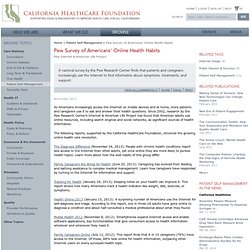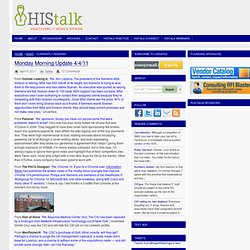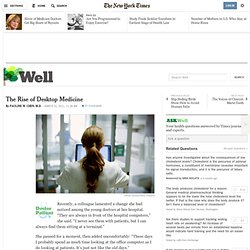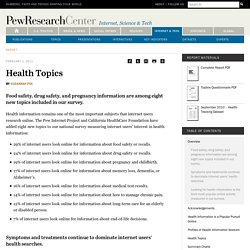

Health Topics: 80% of Internet Users Gather Health Information Online. As Americans increasingly access the Internet on mobile devices and at home, more patients and caregivers use it to ask and answer their health questions.

Since 2002, research by the Pew Research Center's Internet & American Life Project has found that American adults use online resources, including search engines and social networks, as significant sources of health information. The following reports, supported by the California HealthCare Foundation, chronicle the growing online health care revolution. The Diagnosis Difference (November 26, 2013): People with chronic health conditions report less access to the Internet than other adults, yet once online they are more likely to pursue health topics. Learn more about how the web habits of this group differ. Family Caregivers Are Wired for Health (June 20, 2013): Caregiving has evolved from feeding and bathing assistance to complex medical management.
Tracking for Health (January 28, 2013): Keeping notes on your health can improve it. Monday Morning Update 4/4/11. From Outside Looking In: “Re: Ann Lazerus.

The president of the Siemens MS4 division is retiring. MS4 had 500 clients at its height, but Siemens is trying to woo them to the less proven and less stable Soarian. An executive was quoted as saying Siemens will bid Soarian down to 100 beds. MS4 support has been cut back, MS4 executives aren’t even bothering to contact their assigned clients because they’re competing with their Soarian counterparts. ,Once MS4 clients see the price, 90% of them don’t even bring Soarian back as a finalist.
From Palomar: “Re: sponsors. From The PACS Designer: “Re: Chrome 10. From Sick of Snow: “Re: Bayonne Medical Center (NJ). From MaxPayneUK: “Re: CSC’s purchase of iSoft. From Seekhau: “Re: [company name omitted]. Two-thirds of respondents said Epic wouldn’t be a good choice for DoD when I ran that poll a few months ago. Listening: The Kooks, cheery British pop. Welcome to new HIStalk Gold Sponsor Winthrop Resources of Minnetonka, MN. Doctor and Patient: The Rise of Desktop Medicine. David Sacks/Getty Images Recently, a colleague lamented a change she had noticed among the young doctors at her hospital.

“They are always in front of the hospital computers,” she said. “I never see them with patients, but I can always find them sitting at a terminal.” She paused for a moment, then added uncomfortably: “These days I probably spend as much time looking at the office computer as I do looking at patients. It’s just not like the old days.” Doctors have a tendency to veer toward nostalgia; but lately a kind of mass sentimentality has overtaken the profession. Unfortunately, the reality is that it’s not so easy to jettison the lab results and technology. But it’s not, according to a recent commentary in The Journal of the American Medical Association, because we are failures or have given up on practicing good medicine. “We can’t sit here and throw up our hands and say that medicine is going to hell in a handbasket,” said Dr. That change revolves around the computer. Health Topics. By Susannah Fox Food safety, drug safety, and pregnancy information are among eight new topics included in our survey.

Health information remains one of the most important subjects that internet users research online. The Pew Internet Project and California HealthCare Foundation have added eight new topics to our national survey measuring internet users’ interest in health information: Symptoms and treatments continue to dominate internet users’ health searches. Six topics were repeated from previous surveys, in some cases adding to trends that date back to 2002: Looking for health information is the third most popular online activity measured in our surveys. Eight in ten internet users look online for health information, making it the third most popular online pursuit among all those tracked by the Pew Internet Project, following email and using a search engine. The most likely groups to look online for health information include: PIP_HealthTopics.pdf (application/pdf Object)